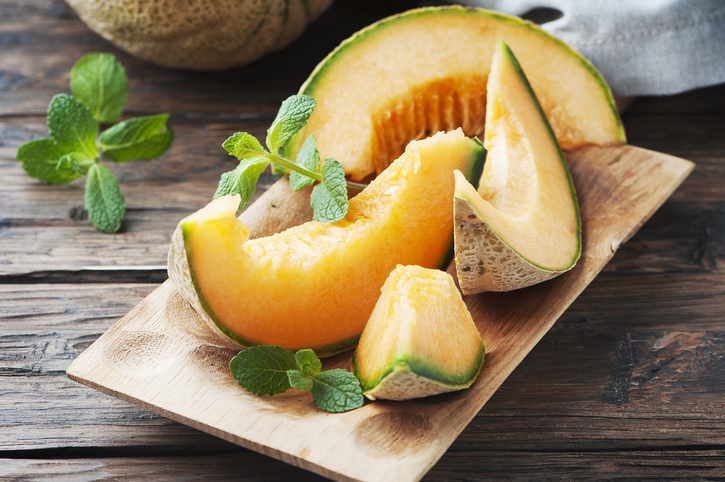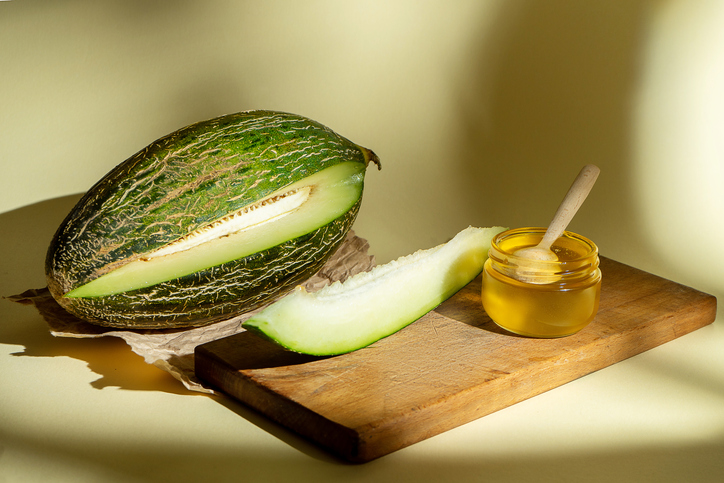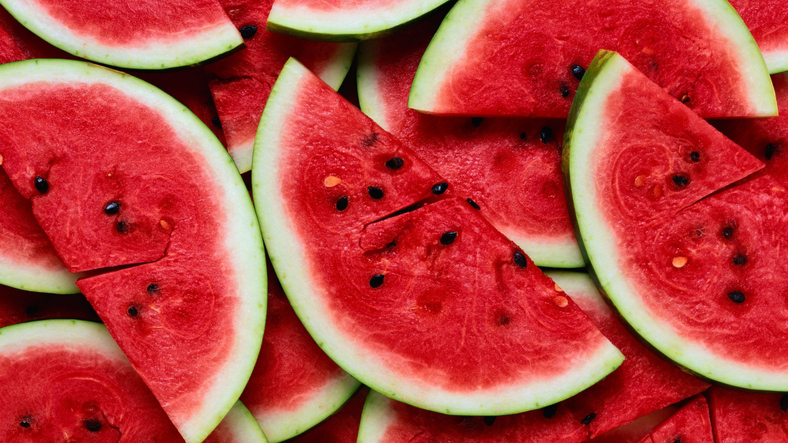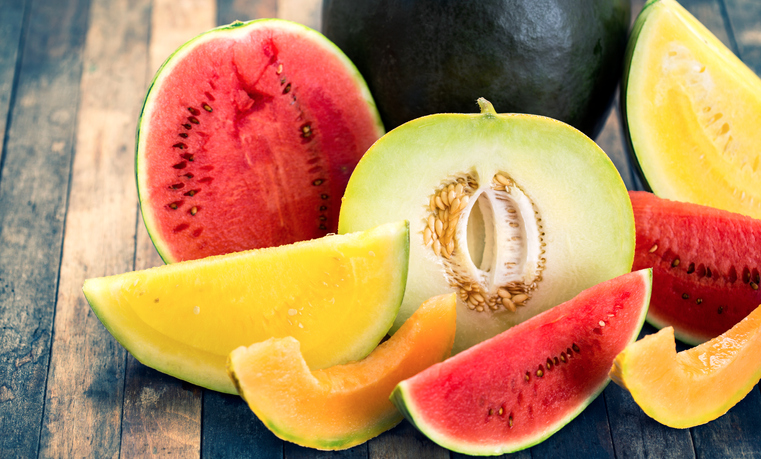Melon is the fruit king of summers. Being one of the most widely used fruits, melons are second to none when it comes to nutrient-rich calories.
If we look back at its history, it is believed that melons have been around since the ancient Egyptian types. Northeast Africa evidences melons’ first-ever domestication at about 2000 BC.
Today, the fruit has earned globalized popularity from Australia to Africa. It is a popular, refreshing, and nutrient-rich snack used by adults and kids alike. This fruit has endless uses, from using them in salads to incorporating them into medicines.
Melons are highly versatile and have many types and sub-types, each more special than the other. If you want to learn more about this blessed fruit, then stick around till the end.
Types of Melons
Melons belong to the plant family of Cucurbitaceae. This is the same class where cucumbers and squashes reside. So, in a way, you can say that melons are cousins of squashes. There are two broad classes of melons: Citrullus Lanatus and Cucumus melon, otherwise called watermelons and muskmelons.
Every year in the summertime, nearly 20 different kinds of melons are harvested in bulk quantities. These refreshing fruits are a delicacy on scorching hot days. People in every corner of the world love and enjoy this treat during summers. Out of dozens of types of this plant, the famous ones are listed below:
1. Cantaloupes

They are probably the most popular form of melon and are therefore readily available at grocery stores across Europe and America. They have a sweet and juicy orange fruitiness enclosed inside the grey-green skin.
2. Ha’Ogen Melons
This one is named after Israel, from where it is produced. It has a green exterior, which changes into yellow as the fruit ages. It also possesses a sweet tropical taste that leaves the eater speechless like other melons.
3. Ananas
This middle-eastern kind of melon named after pineapple represents its tropical taste. It is more challenging than other melons but in no way any inferior in the taste department.
4. Honey Globe Melons

As the name reveals, these melons are shaped like a globe with sugary sweetness enclosed inside. Similar to honeydew, it has a delightful taste. Its white exterior makes it stand out from the rest of the types. However, the uniqueness doesn’t come cheap, making it one of the costlier members of the melon family.
5. Canary Melons
Canary melon is oval-shaped. It is a bright yellow melon with a hard rind and a waxy touch. The inner flesh is green, and the taste has a tangy twist. One can also say that it is similar to a pear in taste.
6. Honeydew Melons
As the name suggests, this melon is lovely to taste. It has a higher sugar content as compared to other fruits. As it matures, its flesh becomes sticky and quite velvety to touch.
The popularity of Honeydew melons is based on the preferences of the consumer. If a person likes sweets, he’ll appreciate this melon as well.
7. Watermelons

All-time famous fruit, watermelon has dozens of sub-types. All of them differ in size, shape, color, and hardness. But they are pretty much all the same when it comes to taste. With up to 90% of water content inside, they can be a thirst-quenching snack in the summers. Some contain seeds while others are seedless, but anyhow, every single one of them tastes delicious.
8. Snap Melons
Known for their healing properties, snap melons are produced in Asia. Because warm and dry weather of the region promotes the growth of snap melons. Their flesh has a tangy taste that is different from all the other types. In addition to that, they are unique but in a good way.
Nutritional Value of Melons
Melons, especially cantaloupes, are loaded with nutrients, including; protein, vitamins, and minerals. Botanical research experts and nutritionists believe that one average-sized cantaloupe contains 55 calories. Anyhow, a cantaloupe alone can suffice your daily intake of vitamin A and C. There are also traces of fibers and minerals like potassium.
A medical study conducted in the early 2000s reveals the presence of beta-carotene in higher concentrations in cantaloupes. Beta-carotene is primarily a plant pigment used by the body as a source of vitamin A. According to the US Food and Drug Administration, 160g of cantaloupe contains.
- Calories 54 kcal
- Sodium 26 mg
- Protein 1g
- Carbohydrates 14g
- Dietary Fiber 1g
- Sugar 13g
- Calcium 1% of the DV (Daily Value)
- Iron 2% of the DV
- Vitamin A 108% of the DV
- Vitamin C 98% of the DV
Melons also contain excessive levels of amino acid; citrulline, which helps remove fatigue and weakness and improves exercise performance. Additionally, it proves to be a rich source of antioxidants, including lycopene, carotenoids, and cucurbitacin E.
Health Benefits of Melons
Consuming melons regularly can turn around a person’s life. While most people think melons offer nothing but excess water and sugar to the body, there is so much more to the benefits of melon. In addition to the delicious and refreshing flavor, melons provide the following health benefits:
Relives Blood Pressure and Improve Cardiac Health
Watermelon contains lycopene in abundant quantities. The compound adds a red color to different fruits like tomatoes and guava. Research has proved that lycopene effectively lowers cholesterol levels in the blood and, in turn, limits any oxidative damage caused by that.
Lycopene improves many health conditions, including heart problems. It is a powerful antioxidant that gets rid of inflammation and boosts several healthy responses in the body.
High blood pressure can result in severe cardiac issues and eventually heart attack if not properly treated. Melons contain citrulline amino acid that facilitates the increase of nitric oxide in the body. As a research study indicates, the high concentration of nitric oxide initiates blood vessel expansion which significantly lowers blood pressure and limits the chances of developing atherosclerosis.
Anti-cancer Properties
Melons are a good source of antioxidants that are efficient in inhibiting the production and growth of cancerous cells. Several studies have highlighted that lycopene can effectively limit the risk of developing colorectal, prostate, and breast cancer.
The anti-oxidant work by inhibiting the growth of IGF – a hormone that carries out cell division. Another vital component found in melons, cucurbitacin E, helps prevent tumor growth by removing cancerous cells from the body.
Anti-Inflammatory Characteristics
Inflammation can lead to further and more severe chronic diseases if not properly dealt with at the right time. Thankfully, the rich amounts of antioxidants and vitamin C in melons can limit oxidative stress and inhibit inflammation in the body.
According to a study, people given 500 mg of vitamin C daily exhibited an increased reduction in the inflammatory markers in the body. Some researchers believe that lycopene can effectively prevent Alzheimer’s’ disease. Nevertheless, additional studies still need to be conducted.
Relieve Muscle Soreness
Melons can help relieve muscle soreness with the help of one of its crucial amino acids – citrulline. The protein can help boost exercise performance and reduce any lingering muscle soreness.
A study found that consuming citrulline for a week straight boosts the anaerobic respiration in the body. Moreover, it also promotes the growth of nitric oxide that relieves blood pressure caused by increased body activity. It will also smoothen the blood pumping mechanism of the heart, thus helping in lowering fatigue in the body.
Comfort to Stomach Aches
As discussed earlier in this article, our digestive system gets exhausted with heavy junk foods. This causes stomach aches and disturbed bowel movements. The amalgamation of fibers and water in melons keeps the digestive tract sound and healthy. This can help recover from digestive disorders like constipation by facilitating bowel movement through high water content.
Improves Skin and Hair Health
Melons naturally contain a good amount of collagen that helps improve skin conditions and brings back their elasticity. In addition to the Vitamin C found in them, melons also have high proportions of vitamin A that promotes the growth and nourishment of body tissues, including the ones in skin and hair.
According to research, if you suffer from chronic skin conditions, try adding more foods like melons to your diet. The high watery proportion in the cantaloupe helps keep the skin soft and smooth. Moreover, the efficacious minerals and vitamins present in the body help prevent hair loss and promote hair growth.
Risks and Precautions
While this fruit has excellent benefits, some risks and precautions are attached to its over-consumption. Some of such side-effects are listed below:
May Spike Your Blood Sugar Levels
Even though it is preferred for a person to eat different fruits as their primary source of sugar intake, it should be kept in mind that they are still highly sweet. And while melons will help you satisfy your craving for a sweet treat, you shouldn’t go overboard with it.
Or else it can spike up the blood sugar levels in your body, leading to several problems, especially for diabetic patients.
High Water Content
As discussed above, melons have an abundant quantity of water. On the one hand, this is a good thing. But on the other hand, this property can be misused.
People use melons, or more specifically, watermelons, to lose weight. The water content makes them feel fuller and satisfied, thus leading to weight loss.
But little do they know, it only sheds away from their muscle mass, although fat is the real culprit of weight gain and obesity.
Hyperkalemia
Melons and many other fruits are rich sources of potassium. This element provides many benefits to the body, but it can lead to hyperkalemia if taken in huge quantities. Meaning it will raise the potassium content in the body, which can cause many side effects like nausea and fatigue.
How to Tell When a Melon is ready to Consume?
Melons are delicious, actual. But there is a fine line between a fairly ripe melon and an unripe fruit. Even a few hours can entirely change the taste and texture. You must choose a fruit ready to eat and ripe according to your taste palate.
This task seems easy, but it is pretty challenging to observe the ripeness and texture in reality. Every type of melon has a different way of representing its ripeness. For better understanding, each of them is discussed separately.
Things are a little different for cantaloupes and muskmelons. It is fairly easy because the plant does the job for you. When the fruit is ready to eat, it falls off the plant, leaving a dish-like scar on the rind. At this moment, it has the maximum flavor, and you can enjoy it any way you want.
Lastly, let’s understand the concept of watermelon ripeness. When a watermelon is fully ripe, the leaf right along the fruit will turn brown and curl away. It may seem absurd, but it is true. Also, sometimes the portion of the ground where the fruit rests turns yellow. These signs are subtle and hard to notice, but the results will be worth the hassle if you pay close attention.
FAQs: A Complete Guide to the Types and Health Benefits of Melons
Is it okay to eat melons every day?
Melons are highly nutritious fruits offering a wide range of health benefits. Consuming melons every day pose no threat to your health, considering you are not overeating. In fact, they are beneficial. Despite being sugary, people are 12% less likely to develop diabetes if they consume melons and other fruits daily.
Are cantaloupes good for skin?
Considering the high concentration of minerals, vitamins A, B, and C, and watery content in melons and cantaloupes, they are largely beneficial for the skin. Consuming appropriate servings every day can make your skin look bright, healthy, and supple.
Does watermelon help in weight loss?
Unlike most other fruits, watermelons contain the least calories per serving (54 kcal per 160g). Not to mention, almost 90% of the substance is water that helps improve the digestive system. Thus, if you are looking to shed some pounds, adding watermelon to your diet can help the cause.
Are there any risks linked to melon consumption?
There is no denying that melon offers numerous health benefits. However, if consumed excessively, it can lead to specific health issues like high blood pressure, sudden weight loss, and hyperkalemia – a state associated with elevated potassium concentration in the body.
In a Nutshell
Melons are an underrated fruit that deserves the attention of all kinds. There are various types of melons, and each one proves to be better than the other. It is a rich source of water, lycopene, and other nutrients. In addition to that, melons have many health benefits, including stroke prevention and blood pressure reduction.
This fruit is harvested in the summers, a perfect time for its refreshing qualities. It doesn’t require much effort to grow, and unlike some other fruits, it is harvested everywhere from Africa to Asia.

